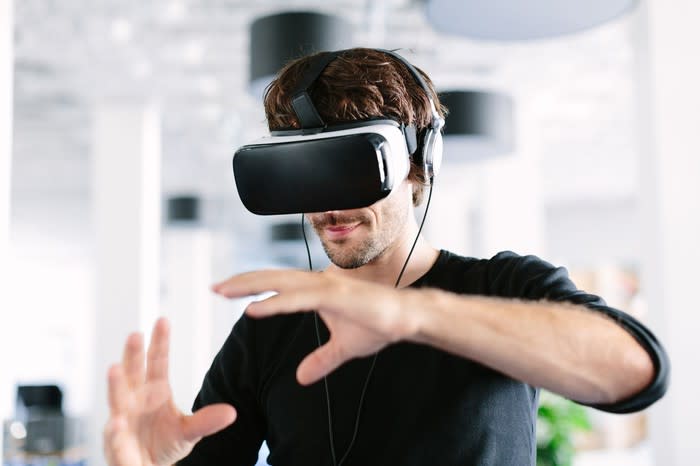Lenovo Is Using Its Head: Partnering With VR Headset Pioneer Oculus Is Just One of Its Smart Moves
Among tech stocks, the buzz is all about Oculus, the market leader in virtual reality (VR) and augmented reality (AR) technology acquired by Facebook (NASDAQ: FB) in 2014. But while Facebook's Oculus is getting all the attention, it's worth looking at one behind-the-scenes player that's been instrumental to Oculus' success .
Oculus emerged as the front runner to deliver AR in an affordable and usable form. Its latest Oculus Quest is beating rival products from HTC Vive and Sony . Still, an investment in any of VR or AR tech stocks is a risky one at this stage in the game.

Image source: Getty Images
The less visible movers and shakers
In that vein, let me draw your attention to PC giant Lenovo Group Limited (NASDAQOTH: LNVGY). In March, Lenovo announced a partnership with Oculus to develop a more immersive gaming headset, and the company was integral to the development and roll out of the Oculus Rift headset, the predecessor to the Oculus Quest.
Now that the market has seen what an Oculus-Lenovo collaboration could do, some are predicting that Lenovo will continue its success with other strategic partnerships.
Powerful collaborations
Lenovo is striking while the iron is hot and reaching out to strong market players. In August, Intel and Lenovo announced a multiyear collaboration that intends to focus on high-performance computing (HPC) and artificial intelligence (AI). Lenovo will provide the turbo boost to Intel's hardware and software. The partnership has lofty goals including developing solutions to "some of the most pervasive world challenges, including genomics, cancer, weather and climate, space exploration and more," according to Intel.
Other partnerships that Lenovo has sealed include an alliance with Qualcomm and a joint venture with Fujitsu . In 2018, Lenovo acquired 51% of Fujitsu PC business, which improved shipments and PC sales for Lenovo. The alliance with Qualcomm resulted in the world's first 5G PC. Lenovo also has a patent cross-licensing deal with Microsoft , which will give Lenovo a stronger footing in the mobile market from the use of Microsoft's apps, an area where its subsidiary Motorola is lacking.
For anyone paying attention, it's clear that all this strategic maneuvering has played a part in positively influencing Lenovo's financials.
Strong earnings
Lenovo had better than expected earnings leading up to the Oculus partnership announcement, and this has been the case since.
For the last earnings announcement, the group announced that revenue grew year-on-year for eight consecutive quarters. Revenue reached $12.5 billion. Net income of $162 million was up $85 million year-on-year, which was an increase of almost 200%. More importantly, the company claims a market share of close to 25%.
Lenovo's stock has returned 32.17% in a year's time, against the industry's decline of 5.4%. Lenovo had a higher dividend yield and pay-out ratio than its competitors. Lenovo's dividend yield is 4.7% compared to 3.3% for Hewlett Packard and 1.5% for Apple . The company's payout ratio is 68.1% versus 24.24% for Hewlett Packard and 25.13% for Apple. Although high, the pay-out ratio is not unsustainable.
Some analysts say Lenovo is undervalued; the company's price to free cashflow ratio is 11.53%, which is lower than the industry average at 19.02%. The stock is trading with a P/E ratio of 15.08, which compares well with Hewlett Packard at 9.36 while Apple has a P/E ratio of 25.13%.
Moving forward, Lenovo has its eye on the huge Chinese market. While the U.S.-China trade war could create obstacles, all of Lenovo's US competitors are facing the same problems as are Chinese manufacturers who want to trade with the US, so the chances are that it all might just even out.
Lenovo is seeing higher earnings and making great strategic decisions. This all goes to show that it's worthwhile looking not just at the company that brings the next shiny new object to market, but at the stalwarts working diligently behind the scenes. Lenovo is a quiet mover, and one that is using its head.
More From The Motley Fool
Teresa Kersten, an employee of LinkedIn, a Microsoft subsidiary, is a member of The Motley Fool's board of directors. Randi Zuckerberg, a former director of market development and spokeswoman for Facebook and sister to its CEO, Mark Zuckerberg, is a member of The Motley Fool's board of directors. Caroline Banton has no position in any of the stocks mentioned. The Motley Fool owns shares of and recommends Apple, Facebook, and Microsoft. The Motley Fool owns shares of Intel and Qualcomm and has the following options: short September 2019 $50 calls on Intel, long January 2021 $85 calls on Microsoft, short January 2020 $155 calls on Apple, long January 2020 $150 calls on Apple, short January 2020 $155 calls on Apple, and long January 2020 $150 calls on Apple. The Motley Fool has a disclosure policy.
This article was originally published on Fool.com

 Yahoo Finance
Yahoo Finance 